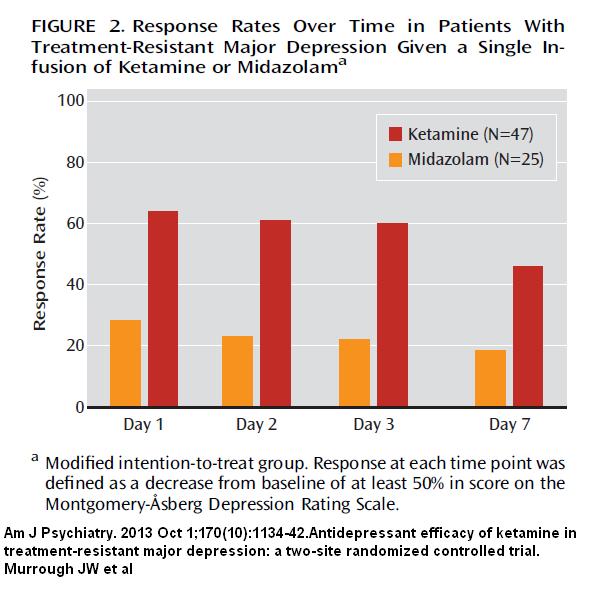Depression was induced in rats by Forced swim procedure followed by “chronic unpredictable stress”. Control group did not recover. Rats subjected to 15 days of ketamine – were still good 2 months later, suggesting lasting results could be obtained but how much is needed?
Biol Psychiatry. 2013 Nov 15;74(10):750-9.
Repeated ketamine exposure induces an enduring resilient phenotype in adolescent and adult rats.
Parise EM, Alcantara LF, Warren BL, Wright KN, Hadad R, Sial OK, Kroeck KG, Iñiguez SD, Bolaños-Guzmán CA.
http://www.ncbi.nlm.nih.gov/pubmed/23790225
- 15 daysconsecutive days of ketamine (20 mg/kg) twice
- “Repeated ketamine exposure resulted in anxiolytic- and antidepressant-like responses 2 months after drug exposure. None of the ketamine doses used were capable of inducing drug-seeking behaviors as measured by place preference conditioning.”
Comment – Since medications used to treat depression in adolescent victims can induce suicidal ideation, I think some measure to prevent suicidal thoughts need to be taken. I have been told I am out of line giving ketamine to depressed patients. Apposedly, I believe it is malpractice not to do so as the suicidal risks are too high otherwise – particularly in adolescents. A protocol of ketamine 10 mg IM into deltoid – and if no side effects repeated in 15 minutes is a totally benign procedure. I am beginning to see persistent relief with use 2-3 times a week while other meds are having a chance to take effect. I recently heard astonishment at my use of ketamine – I am astonished it is not being used. A recent study demonstrated it will rapidly remove suicidal thoughts for potentially weeks:
No Need to Fear Suicidality – Rapid Relief of Suicide Intent With Ketamine
http://painmuse.org/?p=1468
a recent study tried ketamine in “treatment resistant depression”
Am J Psychiatry. 2013 Oct 1;170(10):1134-42. doi: 10.1176/appi.ajp.2013.13030392.
Antidepressant efficacy of ketamine in treatment-resistant major depression: a two-site randomized controlled trial.
Murrough JW, Iosifescu DV, Chang LC, Al Jurdi RK, Green CE, Perez AM, Iqbal S, Pillemer S, Foulkes A, Shah A, Charney DS, Mathew SJ.
http://www.ncbi.nlm.nih.gov/pubmed/23982301
- intravenous infusion of ketamine hydrochloride (0.5 mg/kg) – which would come to 10 – 15 mg IM deltoid every 15 min X 3 as used in one protocol for neuropathic pain treatment:
INTRAMUSCULAR (IM) KETAMINE FOR TREATING MIGRAINE AND NEUROPATHIC PAIN IN THE CLINIC http://www.anodyneheadachepain.com/Research/APS4.pdf – beauty of it is, that if they start getting any depersonalization experience, you don’t give the next dose - Control got midazolam
Results:
Those that responded had relief for at least 3 days. I give ketamine 2-3 times/week in worrisome cases. How long would it take? I really don’t know, because I am using it to prevent any suicidal thoughts while waiting for other meds to kick in. A recent case started on lamotrigine (among other things) is now better within weeks of ketamine use. Patient has now done well without further ketamine.
It does look from above that twice weekly ketamine should hold the pateint. I find 10 mg x2 less sedating, but that might need 3 times a week use.
Use of ketamine in PTSD has been a bit dicey because the depersonalization one can get during ketamine is unpleasant for PTSD vicitim. However, one resistant case found it useful:
AANA J. 2013 Apr;81(2):118-9.
Effects of ketamine on major depressive disorder in a patient with posttraumatic stress disorder.
Womble AL
http://www.ncbi.nlm.nih.gov/pubmed/23971230
“This patient, who had debilitating and treatment-resistant major depression and PTSD, was treated by intravenous infusion of ketamine and experienced substantial short-term resolution of symptoms.”
A recent investigastion found that the initial ketamine treatment induced beneficial changes in sleep that may be part of its quick response:
Curr Psychiatry Rep. 2013 Sep;15(9):394. doi: 10.1007/s11920-013-0394-z.
Ketamine, sleep, and depression: current status and new questions.
Duncan WC Jr, Zarate CA Jr.
http://www.ncbi.nlm.nih.gov/pubmed/23949569
“The slow wave effects are limited to the first night post-infusion, suggesting that their increase is part of an early cascade of events triggering improved mood. Increased total sleep and decreased waking occur during the first and second night post infusion, suggesting that these measures are associated with the enduring treatment response observed with ketamine.”
I hope this is making ketamine more available to patients as I find any cases of suicide very distressing as it is so unnecessary. A new paradigm for treating depression is being established and I think psychiatrist should hurry up and get with it:
Ann N Y Acad Sci. 2013 Jul;1292(1):21-31. doi: 10.1111/nyas.12223.
New paradigms for treatment-resistant depression.
Zarate C, Duman RS, Liu G, Sartori S, Quiroz J, Murck H.
http://www.ncbi.nlm.nih.gov/pubmed/23876043

